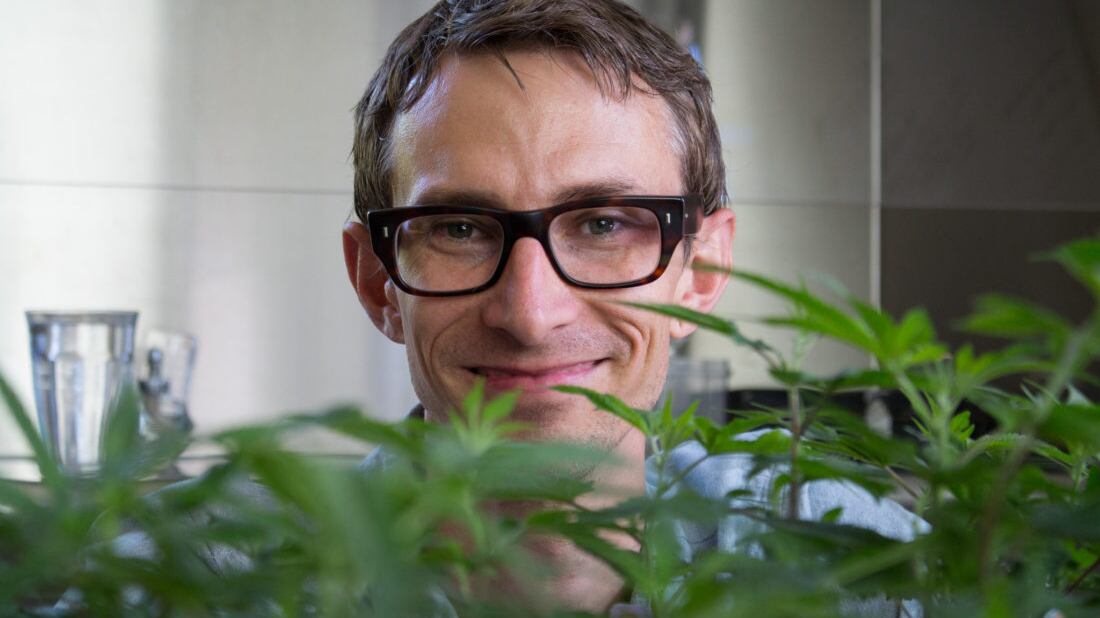Jeremy Plumb is the renaissance man and mad scientist of cannabis in Portland—and one of the most respected cannabis researchers in the world.
He's consulted with cannabis researchers in Israel, and sits on the board of the Open Cannabis Project, researching the cannabis genome. He's also one of the first people lawmakers turn to when they have a question about the plant. His dispensary, Farma, has pioneered new classification systems helping consumers understand the therapeutic and psychoactive effects of different strains of cannabis.
Just as important, however, is Plumb's role at Newcleus Nurseries —a state-of-the-art cannabis farm practicing leading edge ag-tech in harmony with regenerative farming practices.
This March, Plumb will appear at TechfestNW at the Portland Art Museum, a gathering of leading thinkers, startups and established companies that has showcased the the Pacific Northwest's talent and innovation for the past five years. There, he'll discuss the possible ramifications of cannabis innovation for tech arenas stretching far beyond cannabis.
WW spoke with him in advance of his TechfestNW appearance about agriculture, medicine and the moon.
What will you talk about at Techfest?
The key theme is cannabis as a lever or as a wedge—using this as a metaphor to see how the cannabis economy plays out in ways generative to building a livable future.
I'd like to demonstrate the ways that cannabis will act as a wedge, to further ecological horticulture, cannabinopathic medicine, and overall demonstrate the positive force cannabis has played economically already—$60 million in tax revenue in the state.
We're sitting at the precipice of technologies that will transform the world—the use of the technologies of cannabis for ag-tech. No other space is receiving the kind of investment the cannabis industry is bringing.
So cannabis is like the moon missions—the amount of investment creates technologies useful elsewhere?
Cannabis in a lesser sense, but maybe more urgent sense, will help us reenvision agriculture. It's not enough the criticize the old model, you have to demonstrate a new model that makes the old one obsolete. For the first time at Newcleus or others at the edge of this—we will offer an environment that's not in a textbook, not a set of good ideas that lies nowhere. We will use a hundredth of the water of a Klamath Basin farmer, use the most effective strategy on the planet to capture carbon out of the atmosphere. We're still a tiny fringe, but as the scale of economy surrounding cannabis grows, we take agriculture on this journey out of the green revolution, away from harvest monocultures and pesticides… In the creation of best practices, LED lights, rainwater catchment, [cannabis farming] is reinventing agriculture after the green revolution.
Are there other arenas outside of agriculture?
Another big subject is cannabis therapeutics—exploring some of the emerging technology will allow us to more effectively augment people's quality of life. Bringing chemistry and genomics into the equation with research over time will make it possible to serve people in a more specific, targeted fashion and to work more effectively with seizure disorders, IBS, chronic pain, and all the issues that occur if you're an oncology patient, among many others.
With ag-tech and cannabis therapeutics and the measures of that—it's interesting to look at the benefits, either to job creation or innovation. It'll become one of the largest businesses in Oregon.
Will cannabis as medicine ever become mainstream?
There have been all sorts of false claims—there's a reason why there's a lot of distrust…. Cannabinopathic medicine—cannabinoid-based therapy—we're at the state where we finally bring research into the equation at OHSU and other high-level research partners, to demonstrate the efficacy of cannabis therapeutics, and framing the role it plays.
People are confused by the stigma—often the stigma disallows people from exploring the benefits. All mammals have an endocannabinoid system. This plant lets us modulate this system in many ways. As cannabis is one of the most benign plants on the planet, we can do this with almost no risk or dangers. We can do a lot of things experimentally, safely. s
Chemotype is the most important indicator for consumers—it's about how much and which kinds of compounds exist in each flower. THC and CBD are the tip of the iceberg. We're staring at an Amazon basin in terms of chemical complexity. Cannabis is the most chemically complex crop on the planet. Hops, grapes—-it's that times 100.
TechfestNW will be held at the Portland Art Museum March 23-24, 2017. For information and tickets, go to techfestnw.com.

